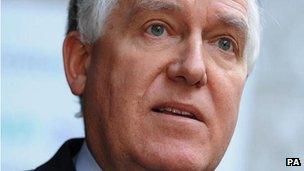On The Runs: Search for a solution
- Published
Under the terms of the Good Friday agreement, which brought an end to 30 years of conflict in Northern Ireland, those already convicted of paramilitary crimes became eligible for early release.
Negotiations continued after the signing of the agreement between Sinn Féin and the government over how to deal with those known as On The Runs.
Sinn Féin sought a scheme that would allow escaped prisoners and those who were concerned they might be arrested to return to the UK.
A formal mechanism proved difficult to establish.
In the hearing to decide whether the trial of John Downey, 62, from County Donegal in the Republic of Ireland, for the murder of four soldiers in Hyde Park in London in 1982, should go ahead, documents from 2000 were cited as evidence of the importance attached to resolving the issue.
On 8 March, Gerry Adams wrote to Tony Blair: "I am deeply disappointed that we have not seen the type of movement we were promised and expected on these issues.
"More importantly, the expectation of movement needs to be met at a time when republicans and nationalists are seriously questioning the value of the Good Friday agreement and the British government's commitment to it.
"Both in terms of restoring confidence in the process and, also, in your own approach to it, I think decisive action on this issue is now essential."
On 28 June, 2000, Jonathan Powell, Mr Blair's chief of staff and the government's chief negotiator at the time of the Good Friday negotiations, wrote to Nick Perry at the Northern Ireland office: "Gerry Adams called me yesterday. He said some of his people were becoming wobbly. He needed to settle them. He asked what was happening with the OTRs.
"I explained we expected two more cases to be dropped this week. He needed to know how we would deal with the OTRs by the end of July."
On 26 July 2000, in an internal memo, the then Secretary of State for Northern Ireland, Peter Mandelson, described OTRs as "an uncleared-up conundrum of the conflict".
A memo from Jonathan Powell in October 2000 to Mr Mandelson recorded: "The prime minister... agrees at this stage we can't do any more on On The Runs and thinks it would be better simply to park the issue for the time being."

In 2000 Peter Mandelson, former Secretary of State for Northern Ireland, said OTRs were an "an uncleared-up conundrum of the conflict"
In May 2003, proposals about dealing with On The Runs were published as part of a joint declaration by the British and Irish governments. By now the issue was linked with decommissioning of IRA weapons.
At the end of September 2005, the Independent International Commission on Decommissioning reported that the IRA had placed its arms completely and verifiably beyond use.
On 13 October 2005, the then Secretary of State for Northern Ireland Peter Hain made a statement to the Commons in response, including a reminder that the government had undertaken to legislate in relation to the On The Runs.
"This is not an amnesty," he said. "Nevertheless the implementation of those proposals will be painful for many people.
"I fully understand this. But the government believes that it is a necessary part of the process of closing the door on violence forever".
In 2006, an attempt to introduce legislation was shelved in the face of widespread opposition.
The proposed law would have seen people accused of paramilitary crimes before 1998 appearing before a special tribunal and then being freed on licence.
Mr Hain, told the Commons the legislation was necessary, and that the issue was not going to go away.
However Sinn Féin's rejection of it, because it would have also covered the Army and police and those guilty of collusion in crimes, made it unworkable.
All the other major political parties in Northern Ireland had also rejected the bill, but for different reasons.

In 2005, Peter Hain made a statement saying the government had undertaken to legislate in relation to the On The Runs
On 28 December 2006, in a confidential letter, the prime minister told Sinn Féin president Gerry Adams that the government was working on putting in place mechanisms to resolve outstanding On The Run cases, including "expediting the existing administrative procedures".
Mr Blair said: "I have always believed that the position of these On The Runs is an anomaly which needs to be addressed. Before I leave office I am committed to finding a scheme which will resolve all the remaining cases".
In February 2007, the Police Service of Northern Ireland began Operation Rapid, the operational name for a review of people regarded as "wanted" in connection with terrorist-related offences up to 10 April 1998.
The review examined what basis, if any, the PSNI had to seek the arrest of individuals identified by Sinn Féin to the government and passed to the Chief Constable.
It was on the basis of these reviews, the John Downey hearing was told, that letters of assurance were sent, or not, to the individual about whose status Sinn Féin had inquired.